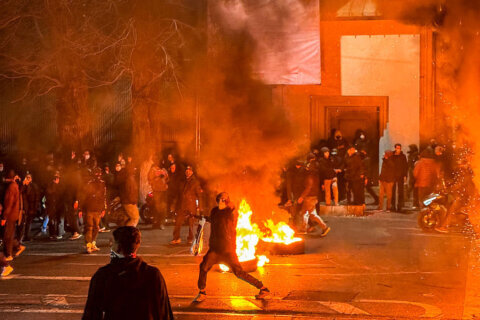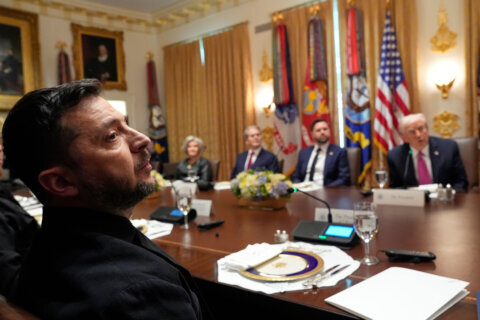WASHINGTON — The U.S. was warned almost a decade ago by a high-level defector that Russia would rise from its devastating post-Cold War crash to once again become the nation’s number-one threat. After years of avoiding confrontational language, U.S. officials are no longer dodging the obvious.
“Russia poses an existential threat to the United States by virtue, simply, of the size of the nuclear arsenal that it’s had. That’s not new,” Secretary of Defense Ashton Carter said at a Pentagon briefing Thursday.
But in reiterating what top generals recently told Congress, Carter said, “What’s new, that they were pointing to and I agree with them, is that for a quarter-century or so, since the end of the Cold War we have not regarded them as an antagonist.”
Carter said that’s now changed: “Vladimir Putin’s Russia behaves in very important respects as an antagonist. That is new. That is something that we need to adjust to and counter.”
This likely was not a total surprise to U.S. intelligence officials. A man who had firsthand knowledge of the Russian government’s secret plans and motivations warned the U.S. of escalating aggression after defecting to the U.S. in 2000.
During an exclusive WTOP interview before his sudden death in 2010, which has still not been fully explained, Sergei Tretyakov, the last publicly exposed, high-profile Russian spy to defect to the U.S., said the U.S. was whistling through the graveyard.
“Americans don’t like problems. It’s easier to close their eyes and say ‘The Cold War is over. We are not supposed to worry anymore,’” Tretyakov said.
He suggested, based in part on deep and highly classified knowledge of the Russian government and military, that in the mind of Russian President Vladimir Putin, the Cold War never ended.
“Unfortunately, that’s not the case. Russia has a very serious military program. They are producing very sophisticated strategic and tactical weapons and I can tell you that the threat from Russia is not over. The more Russia has money, the more aggressive will be its foreign policy [sic],” Tretyakov said.
Carter said Thursday the U.S. would respond to Russia’s antagonism in a “strong and balanced” manner.
He described an unfolding show of strength, saying, “We are adjusting our capabilities to take into account their behavior.”
Carter said the U.S. is working “on a new playbook for NATO” oriented towards deterrence by “hardening countries on the border of Russia — NATO members and non-NATO members — to the kind of hybrid warfare influence, or little green men kind of influence, we see associated with Russia in Ukraine.”
(Hybrid warfare is a military strategy that blends conventional, irregular and cyber warfare; “little green men” refers to rebels in Ukraine who have been using Russian-made weapons to fight Ukrainian forces and appear to have Russian military training, but whose uniforms do not bear any evidence of a connection to Russia.)
The Obama administration has been more subtle in its appraisal of U.S./Russian relations.
“We’re mindful of the threat from Russia, and we’ve made clear the commitment that the United States is willing to make when it comes to backing up our NATO allies who are certainly on the front lines of these tensions,” said White House spokesman Josh Earnest on July 9.
Earnest’s comments came the same day that then-Joint Chiefs Chairman nominee General Joseph Dunford told the Senate Armed Services Committee, “Russia presents the greatest threat to our national security.”
Seemingly downplaying the threat level, Earnest said, the U.S. has, “been able to effectively coordinate with the Russians to advance the interest of the United States. And the best and most vivid example of that that I can give you is that Russian negotiators have been active and constructive participants in Vienna, sitting on the same side of the table as the United States as we compel Iran to take the steps to shut down every pathway they have to a nuclear weapon.”
To Andrew Weiss, vice president for studies at the Carnegie Endowment, who oversees research on Russia, the slightly divergent views on Russia from the administration and military reflect concern about lack of preparedness to respond if Russia’s antagonism continues to grow.
“The [U.S.] military tools to respond are insufficient. We’re dealing with a different kind of Europe — a very different set of security challenges than people were expecting to have to confront,” said Weiss.
The U.S. military presence in Europe is a shadow of what it was at the end of the Cold War.
“We’re at 15 percent of the … troops we have in Europe compared with 1989. It’s simply a totally different defense posture and it’s not developed to deal with the threat of Russian aggression,” said Weiss.
Carter said the U.S. is not planning to turn a cold shoulder towards Russia because the two countries need to cooperate on matters of mutual interest.
“We continue to work with Russia because you can’t paint all their behavior with one brush. There are places where they are working with U.S. — counterterrorism, North Korea, Iran and elsewhere,” said Carter.
He indicated the U.S. would keep channels open to Putin or a successor if they choose to abandon confrontational and self-isolationist behavior in favor of better global economic and political integration.








